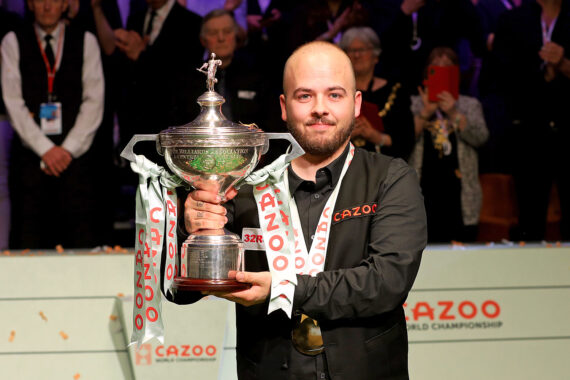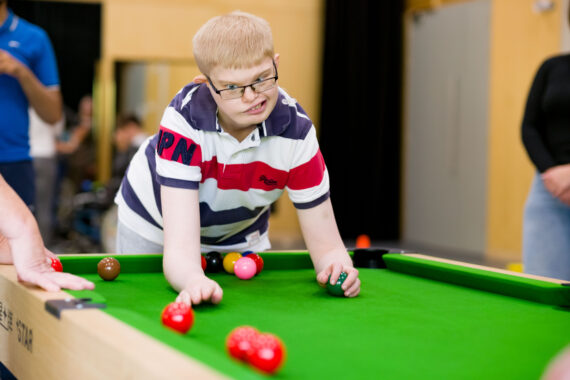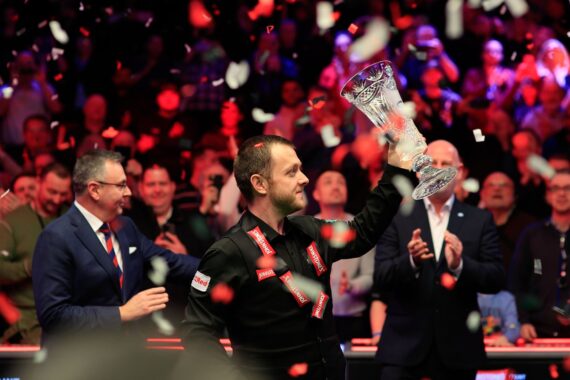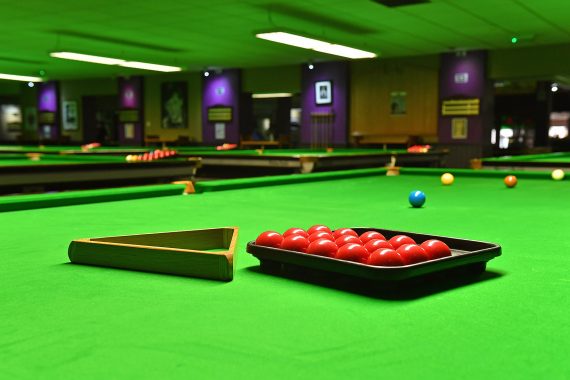Allen Reflects On Dark Times
A year on from the launch of the Mental Health Charter for Sport and Recreation, Mark Allen looks back on the mental health challenges he has faced in recent years and considers the support available to young snooker players.
Mark Allen
When I was a young person trying to make it in the game of snooker, my dream was to turn professional and to one day become world champion. At that age you don’t think of everything else that being a professional snooker player entails, in particular being away from home for long times and the travelling is something that does catch up with you mentally, physically and financially.
It is well-documented that a few years ago it is something that I struggled with. I think the biggest thing for me was being away from home, away from family, away from friends. Staring at four walls in the hotel room all the time was a problem for me.
You feel like you don’t want to leave the house at times, you don’t want to socialise. You get into your own bubble and you don’t want to get involved with anyone really.
A lot of things contributed to it and I’m sure that being a snooker player and being on my own all the time probably triggered it. Also financially I wasn’t in a good place. My relationship that I had been in for a long time had just broken up. It was just the normal things people have to deal with but I didn’t deal with them very well by myself.
It’s a bad place to be in but obviously I had good family and friends around me who pulled me through.
I also went to see a doctor and then for a few months I went and spent a session here and there speaking to a psychiatrist which really helped. I think having a stranger to talk to was easier for me because obviously you don’t want to burden your family and friends with things. Sometimes it’s nice to have somebody who doesn’t really know you that well to speak to. It sounds strange but it really helped me through it.
These days it’s probably something that I have learned to deal with a bit. I still don’t enjoy being away from home, I don’t enjoy being away from my family and friends, but these things happen. You have to sort of put it in the bigger picture. There are a lot of things going on in the world that are worse than what I am going through in my dark times.
The one thing I have to look out for is when I start turning down plans that I have made. That was a big thing I fell into where I made plans and at the last minute I would cancel, I didn’t want to socialise with anyone, things like that. I just wanted to sit there and mope on my own.
It’s probably a bad thing to do whenever you are going through stuff like that, you have to hit these things head on and I just didn’t. I was living on my own and I was single at the time. The amount of days I would just curl up in bed and watch movies all day, didn’t go practice, didn’t socialise with anyone and didn’t see my family at all was pretty scary looking back on it!
I remember one of my friends that I had spoken to about it and he was one that I had cancelled on a number of times and obviously it sort of registered to him as to why. Then a few times then we made plans after that when I was in recovery so to speak, I would not answer my phone and keep my front door locked. At one stage he put two big bins against the wall on top of each other outside of my house and tried to get into my bathroom window just to try and get me out to go and play golf. It was quite funny because he tried to get in the window he couldn’t get in and the bins fell so he ended up hanging from my bathroom window upstairs so I had to help him!
So now I do try to make sure I keep appointments that I make with friends or family or whatever, even if it is for innocuous sort of things.
I’ve got good people around me, I’ve spoken to a few of my close friends and obviously my family know what is going on and they are keeping an eye out for those sort of things too. It’s good to have people to support you. It would be hard for someone to get through it on their own. You need a good group around you.
At events I socialise more now than I did. I still enjoy my movies because it’s something that I enjoy doing but in general I do try to get out and speak to other players who I get on with such as Stephen Maguire and Shaun Murphy, or if Joe Swail has qualified maybe I would try to get out for dinner and a few things like that.
It is just to try and get out of the room because it gets a bit stale in there sometimes spending a lot of time on your own. I think on the whole I always did try anyway, but I make myself do that now.
On how snooker can help promote positive mental health…
It is important to remember that I get to do what I love for a living and that’s something that I did forget a few years back. It got a bit monotonous and don’t get me wrong, not every match you are at 100%, but in general now I think I am better at seeing things in the bigger picture. It is a snooker match. You’ll have another one next week, you go back, you practice hard, you see your family, and it’s not the end of the world.
So snooker is a very welcome distraction at times. It’s still great to perform in front of great crowds at the big events. It’s something I love doing so it’s definitely a good thing to have.
On the support provided by snooker’s world governing body the WPBSA…
It is definitely a positive development to see that the WPBSA have signed up to support the Mental Health Charter as it is a very important issue within the professional game in particular.
Snooker is one of the most psychological sports that you can play so anything to support the players is to be welcomed.
On what can still be done…
One thing that I think would help is if the governing body were able to make some sort of counselling available, that people could undertake confidentially. What we need sometimes as players is somebody to listen and somebody to get your frustration out to.
There’s nobody really within the governing body who could do that currently so it would be good if something could be put in place going down that road.
In particular for young players who are new to the tour because as I said at the start, it’s something that you don’t really think of when you are a young person trying to make it in the game.
For me it was a big shock being away from home so much because I love being at home. Financially there are a lot of expenses going out when you are travelling all the time and going abroad to places like China, Australia and India.
The newcomers need to realise what being a professional snooker player entails and to be mentally prepared for that. It’s not just about playing and I understand that the WPBSA are currently working to build their induction programme up to offer greater support to players going forwards.



